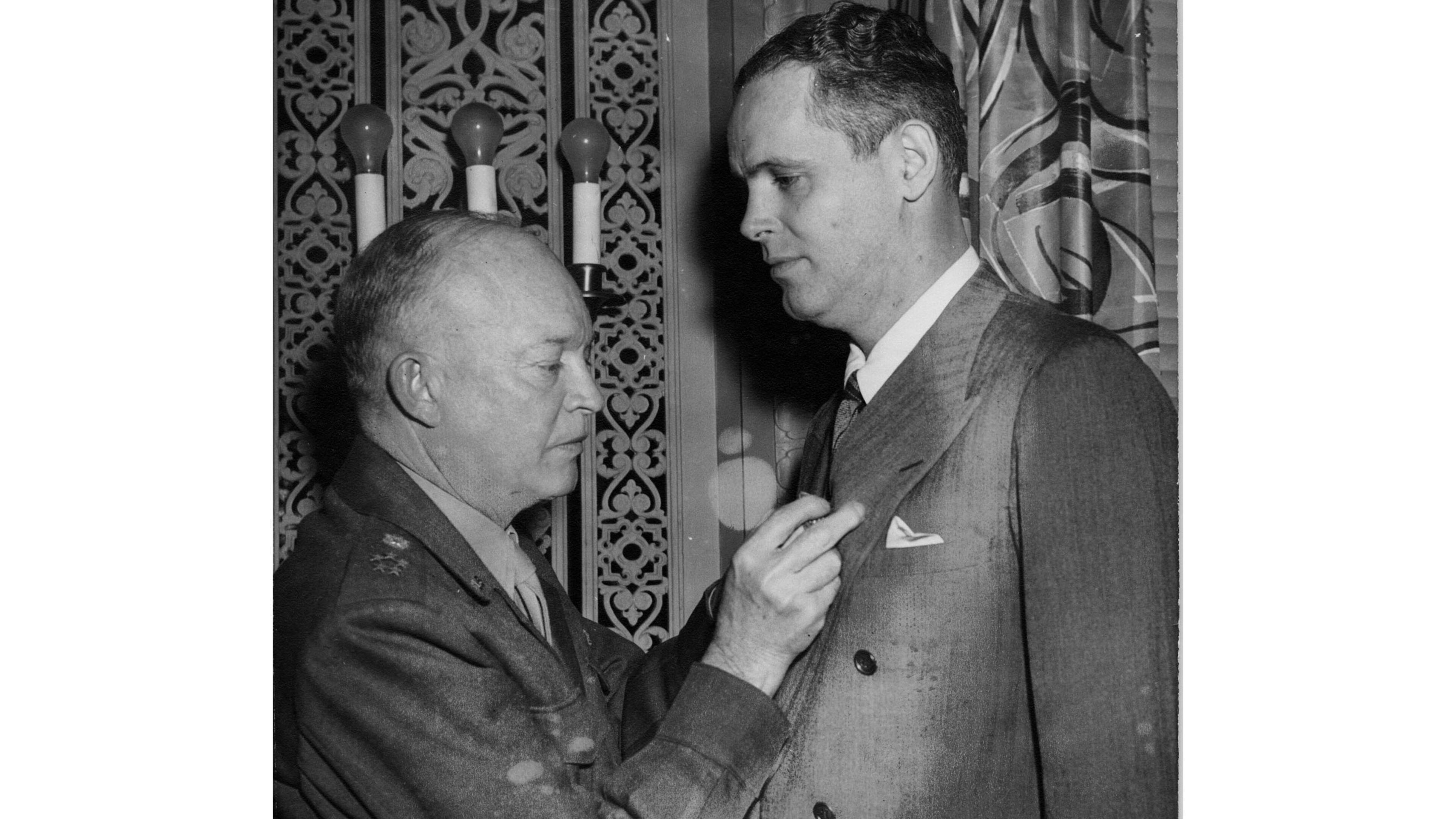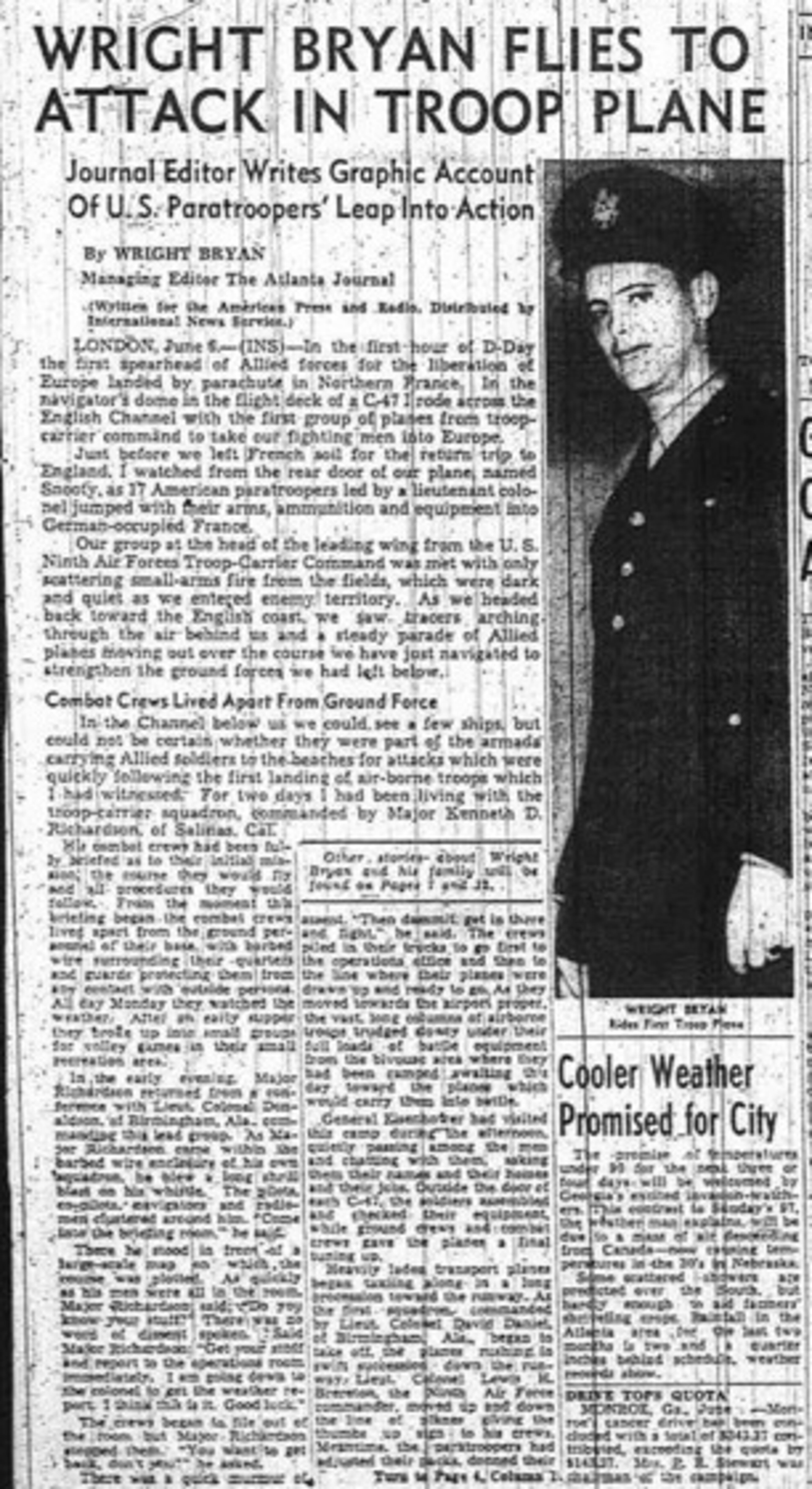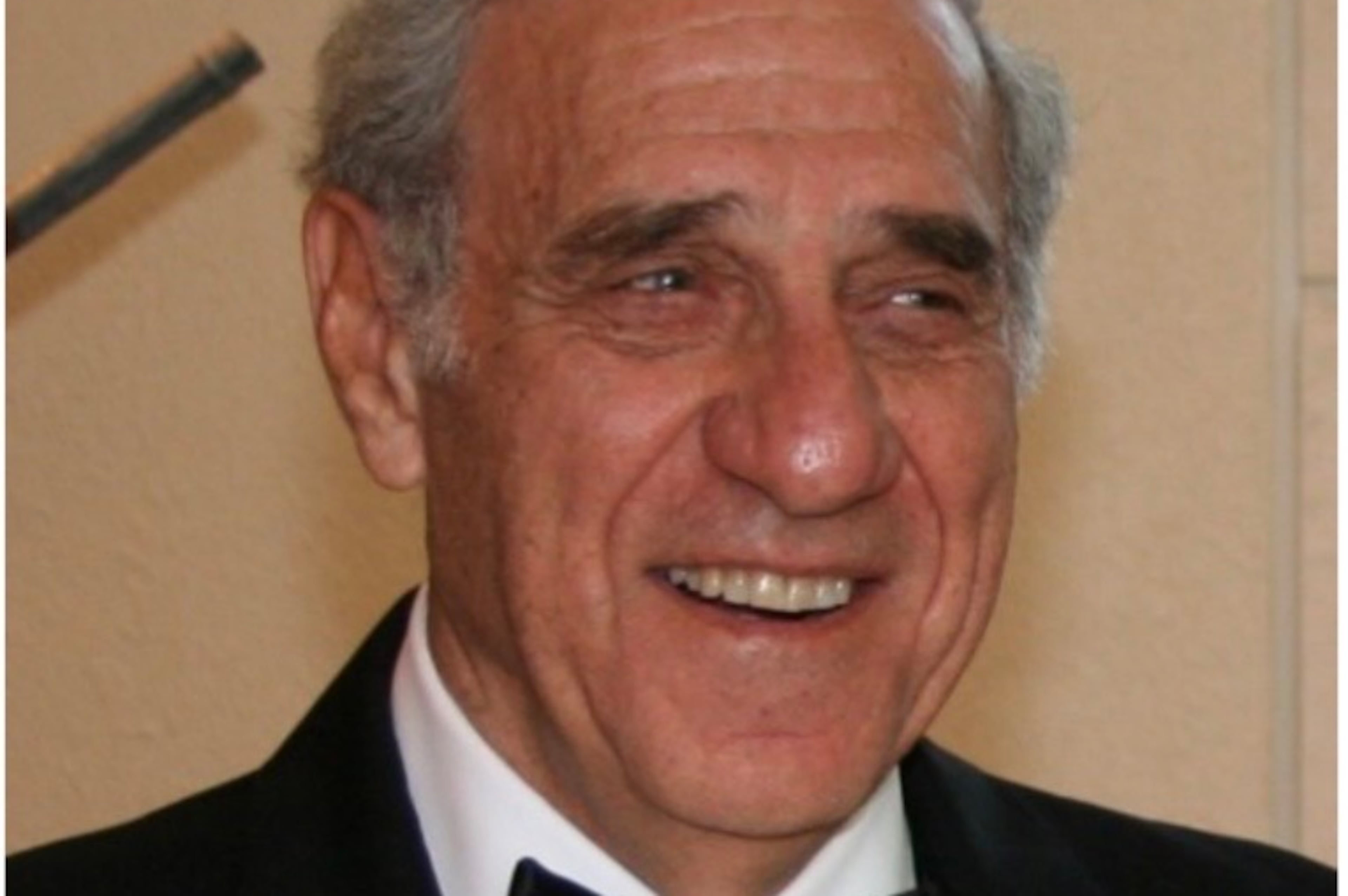Wright Bryan, 85, former editor of Journal; aired 1st account of D-Day

Wright Bryan, a former editor of The Atlanta Journal who as a World War II correspondent broadcast the first eyewitness account of D- Day, died of pneumonia Wednesday at the Clemson Area Retirement Community in Clemson, S.C. He was 85.
He suffered strokes in 1986 and 1988 and last weekend developed pneumonia, a family member said.
A family member said he will be buried in Oakland Cemetery in Atlanta.
He lived at the Clemson Area Retirement Community, and sometimes at his home, both in Clemson.
Mr. Bryan was editor of The Atlanta Journal from 1946 to 1954.
As the Journal's 39-year-old managing editor and war correspondent and NBC radio stringer, he was the first newsman to report on the D-Day invasion of France on June 6, 1944.
On WSB Radio: Listen to audio from Wright Bryan's D-Day broadcast
He covered it from a transport plane dropping airborne troops. The plane flew back to London, and Mr. Bryan went on the air with the news first; other correspondents on the beaches couldn't get back. He beat more than 600 reporters on one of the biggest stories of the century.
Shortly after 9:33 a.m. in London - the prearranged time for revealing that the invasion had begun - Mr. Bryan made his broadcast, following a one-sentence announcement by the Allied command, and tape- recorded statements by King George VI and President Franklin D. Roosevelt.

Mr. Bryan's text ran on the front page of The Journal, The New York Times and other newspapers. It began: "In the first hour of D-Day the first spearhead of Allied forces for the liberation of Europe landed by parachute in northern France . . ."
Telegrams congratulating Mr. Bryan on his scoop filled 13 columns of The Journal the next day. Later, he received one from President Roosevelt.
While covering the Allies' further advance across Europe, Mr. Bryan was wounded and captured by the Germans. He spent six months in hospitals and in a prisoner-of-war camp in Szubin, Poland, until he was freed by Russian troops in January 1945.
He returned from the war a hero and was named editor of The Journal. In 1947, Gen. Dwight D. Eisenhower awarded him the Medal of Freedom, the nation's highest civilian honor.
Mr. Bryan, an imposing man who stood 6 feet 5 inches tall, was president of the American Society of Newspaper Editors in 1953. In 1954, he left The Journal after 27 years to become editor of the Cleveland Plain Dealer. He was editor of the Plain Dealer from 1954 to 1963, and vice president for development of Clemson University from 1963 to 1970.
D-Day 1944: Georgians who played a role
Here are some stories of Atlanta and Georgia connections to the Allied invasion of France beginning on June 6, 1944, D-Day
Atlanta was in the thick of D-Day action
Wright Bryan, 85, former editor of Journal; aired 1st account of D-Day
How Atlantans heard news of the D-Day invasion
Stories of 4 Georgians who made the ultimate sacrifice during D-Day invasion
From 2022- ‘It’s so powerful for them’: WWII vets travel to Normandy in remembrance of D-Day
Born on Peachtree Street
William Wright Bryan was born Aug. 6, 1905, in the 402 Peachtree St. home of his maternal step-grandfather, William A. Wright, comptroller general of Georgia from 1879 to 1929. His father, Arthur B. Bryan, taught English at Clemson and later edited extension service publications.
He grew up in Clemson, reported for the Greenville Piedmont and graduated from Clemson College in 1926, then spent a year at the University of Missouri School of Journalism.
Mr. Bryan joined The Journal in August 1927, becoming city hall reporter in 1928, city editor in 1935, managing editor in 1940, and associate and managing editor in 1943. He left for England as a war correspondent in September 1943.
Saw invasion from plane
On D-Day, he rode in a paratrooper plane across the English Channel and watched the night sky fill with the lights of the hundreds of planes in the invasion.
Mr. Bryan wrote rapidly as the plane that had dropped the paratroopers into northern France returned to England. At the airfield, he flagged a Jeep for a 50-mile ride to BBC headquarters.
His report filled the airwaves in Atlanta. "I didn't go to bed that night," his wife, Mrs. Ellen Hillyer Newell Bryan, recalled. "Anywhere you turned, you heard it. They played it over and over."
That August, Mr. Bryan was traveling with novelist Ernest Hemingway, who was covering the Battle of Normandy for Collier's magazine. They found German 88mm guns hidden under foliage in a field where fighting had occurred only 24 hours before. "Nothing gets old so fast as a battlefield," Hemingway said.
Mr. Bryan broadcast from Paris when it was liberated on Aug. 26, 1944.
Captured by Germans
On Sept. 12, 1944, Mr. Bryan and two other correspondents and a driver left a press camp in a Jeep headed for a French restaurant. North of Chaumont, men wearing armbands of the French Forces of the Interior waved the newsmen along a road. Mr. Bryan suspected these "Frenchmen" were Germans.
Limbs were strewn across the road. Just then, Germans opened fire. Mr. Bryan was hit in a leg, but jumped into a ditch. Germans captured him almost immediately.
Mr. Bryan was taken to a hospital, where a bullet was removed from his leg. Later he was transferred to a POW camp.
Mr. Bryan's Medal of Freedom citation from Eisenhower, presented at the National Press Club in 1947, stated: "For exceptionally meritorious achievement which aided the United States in the prosecution of the war against the enemy in Continental Europe . . . He distinguished himself by his sound judgment, unfailing devotion to the Allied cause and accurate interpretation of operations. He was wounded and captured by the enemy. His great contribution to the accurate orientation of the American people throughout the campaign merits the praise and recognition of the United States."
In 1949, Mr. Bryan and other correspondents returned to France to be awarded the medal of La France a ses Liberateurs.
In retirement, Mr. Bryan divided his time between homes in Clemson, and Sea Island, Ga. He returned to Normandy in 1949 and 1952, and to his POW camp in 1970. He also attended biannual reunions with his former fellow POWs.
He was a former co-chairman of an Atlanta Red Cross drive; a former board member of The Associated Press; former chairman of the Georgia Press Institute; and former president of the local chapter of Society of Professional Journalists, Sigma Delta Chi.
He wrote "Clemson, an Informal History of the University, 1889- 1979." From the school he received an honorary doctorate, a distinguished alumni award, and the Clemson Medallion, the school's highest award. He was alumni association president in 1958.
Mr. Bryan also belonged to the Overseas Press Club, Phi Kappa Psi, and Atlanta's Nine O'Clocks, Capital City Club, Piedmont Driving Club, and First United Methodist Church of Atlanta. He was a former president of the Atlanta Rotary Club.
Surviving in addition to his wife are a son, William W. Bryan Jr. of Atlanta; two daughters, Newell B. Tozzer of Atlanta and Mary Lane B. Sullivan of Cleveland Heights, Ohio; six grandchildren; and two great- grandchildren.
In lieu of flowers, the family requested that donations be made to the Clemson University Loyalty Fund, Clemson, S.C. 29633.

